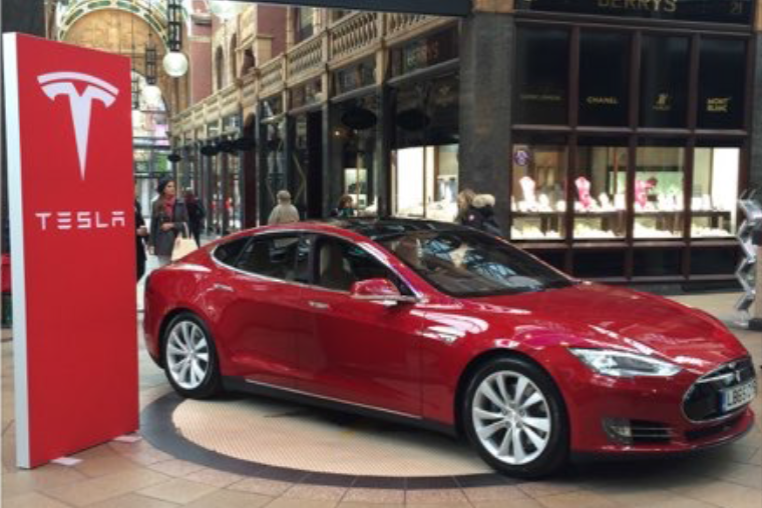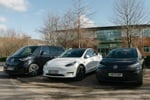Rockar has defended the omni-channel approach to car retail following an announcement by Tesla’s Elon Musk that the brand intends to move its sales entirely online.
The Hyundai Motors UK, Jaguar Land Rover, Ford and Mitsubishi Motor UK retail partner claims to have generated 1.6 million store visits, 12,500 test drives and 1.7 million digital journeys during the past five years and insists that a digital retail experience should not be employed at the expense of physical car dealerships.
Martin Sewell, Rockar’s managing director, said: “At our core is a powerful and dynamic e-commerce platform, designed for an easy customer car buying journey, but we know it definitely doesn’t end there.”
According to Forbes, Wall Street reported an 8% drop in the Tesla share price after the announcements that they were moving to online only last week.
A total of 378 Tesla stores across the globe – 23 of them in the UK and Ireland – are under threat from the shift which has been designed to generate cost saving of around 5% and drive the manufacturer’s liquidity at a time when debts threaten to scupper its ambitious growth plans.
Marketing Week columnist, Mark Ritson, wrote in an opinion piece on the move that Musk had indicated that he understood the potential long-term impact of the measure, the Tesla chief executive having stated: “I wish there was some other way.”
 Ritson, who claims he was persuaded out of the potential purchase of a Tesla Roadster by his local Porsche retailer, who successfully encouraged him to instead place a deposit for the forthcoming Taycan EV, wrote: “As strong as the Tesla brand is, and as impressive and enigmatic as Musk continues to be, omni-channel beats either an exclusive focus on offline retailing or an exclusive move to online sales.
Ritson, who claims he was persuaded out of the potential purchase of a Tesla Roadster by his local Porsche retailer, who successfully encouraged him to instead place a deposit for the forthcoming Taycan EV, wrote: “As strong as the Tesla brand is, and as impressive and enigmatic as Musk continues to be, omni-channel beats either an exclusive focus on offline retailing or an exclusive move to online sales.
“According to Musk 78% of Model 3 sales were already conducted online and 82% secured without a test drive.
“But that’s a clumsy example of last-click attribution if I ever I saw it and beneath the Musk I have grown to admire. How many of those sales were sparked or secured by a visit to a showroom?
“Maybe most of his existing Tesla fans bought without a test drive but he is now penetrating the mass market. A test drive is a crucial moment of truth – especially when it’s your first electric vehicle, let alone your first Tesla.”
Rockar said that it has found that customers expect online interaction and the ability to research their purchase online, but need the possibility of being able to see the car physically too.
“Purchasing decisions are all about experience right now, and a full experience of a product is built through the omni-channel model”, it said.
Rockar said that it “spins” the old ‘time spent’ model of 10% on product and 90% on transaction and make the product and brand experience 90% with the transaction becoming easier and only needing 10%.
Sewell added: “We know that omni-channel doesn’t take away from the technology, it simply enhances it.
“Physical space is still relevant but just as technology has brought rapid change to the car buying journey, the physical space needs to change too.”
Rockar was one of the first to bring car retailing into shopping centres and offer accessibility and transparency when buying a car.
Selling techniques are a thing of the past, it said, with 88% of millennials being negatively influenced by high-pressure sales tactics according to data from CDK Global.
Rockar’s model is to share knowledge with their customers which helps to inform them, not coerce them, in their car buying decision.
It is a model that is being embraced by emerging car brands.
 When Tesla rival Polestar enters the UK market in 2020 – with the Tesla Model 3-rivalling Polestar 2 offering 300-mile plus EV transport for somewhere in the region of £40,000 – it will do so in urban stores manned by commission-free product experts.
When Tesla rival Polestar enters the UK market in 2020 – with the Tesla Model 3-rivalling Polestar 2 offering 300-mile plus EV transport for somewhere in the region of £40,000 – it will do so in urban stores manned by commission-free product experts.
Asked whether Polestar’s model of eliminating commission and guaranteeing a fixed margin on each car sale – with no volume bonus – could pave the way for other brands to adopt something akin to an “agency approach”, Goodman said that could clearly be a side-effect of Polestar’s success.
But he is in no-doubt that his brand’s omni-channel hook-up with traditional retailers is the right way forward. He said: “If retailers see us and the way we do things and see that it’s successful will they then compliment that and perhaps accept a similar model from their other franchised partners, I expect they might.
“The reality is that the model places a lot of pressure on us to generate publicity around the brand and the demand we need to generate in order to get cars to market.
“Have dealers got cast iron guarantees that they are going to sell a certain number of vehicles with us? No they haven’t. But we wanted people to take that gamble, that leap of faith and come with us for the journey and I’m glad to say that we have a group of very well-respected and high-quality retailers on board to help us make this a success in the UK.”















Login to comment
Comments
No comments have been made yet.